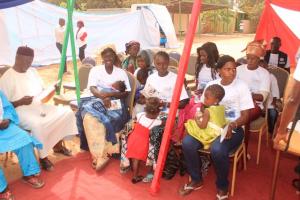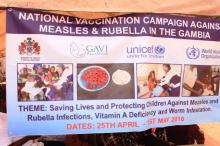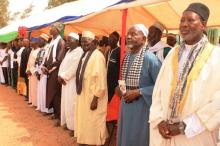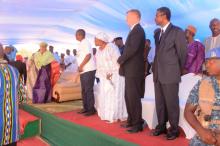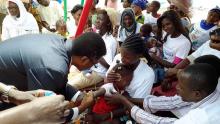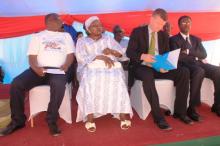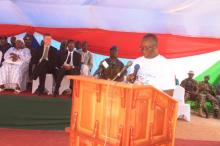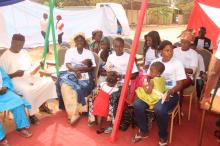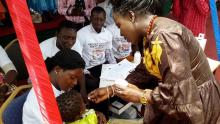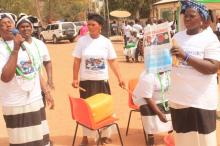Gambia launches Measles-Rubella vaccination campaign
Banjul, 25 April 2016 - After intensive preparations, the Ministry of Health and Social Welfare (MoHSW) in collaboration with WHO, UNICEF and other partners has officially launched the much awaited seven-day nationwide measles –rubella vaccination, which ends on Monday, 1st May 2016.
The campaign, which is integrated with vitamin A supplementation and de-worming, is the first of its kind conducted in the Gambia as echoed by WHO and MoHSW officials at a recent press briefing held be-fore the official launch.
Over 802,000 children aged 9 months to 14 years are targeted for this campaign. The 9 months to 14 years old will receive combined doses of measles and rubella vaccines; those between 6 and 59 months will receive vitamin A supplementation and the 12 to 59 months old will be given deworming tablets.
Meanwhile, speaking on behalf of the First Lady at the official launch held on Saturday 23 April 2016, the Honorable Minister of Health and Social Welfare, Omar Sey, thanked WHO, UNICEF, Global Alliance for vaccine and Immunization (GAVI) and other partners for their continued support to national immunization efforts, and in particular to this very campaign.
The Honorable Minister also reiterated Government’s commitment to fulfilling its obligations to vaccine co-financing agreements with the GAVI. According to the Honorable Minister, this commitment has been translated into increased allocation of resources by the Government to immunization services from 9 to 21 million dalasi over the years.
For their part, WHO and UNICEF issued a joint statement on behalf of the United Nations System, drawing the audience’s attention on the rationale for the campaign as well as the public health threats the two diseases pose to children and young adults.
The two Organizations also commended the Government of the Gambia for its commitment to promoting immunization services by bearing the full cost of its traditional vaccines and injection materials as well as fulfilling its co-financing obligations with GAVI for all the new vaccines introduced.
The impact of this ongoing support, according to the statement, has contributed to sharp reduction and, in some cases, elimination of some childhood vaccine preventable diseases such as Polio, Diphtheria and Pertussis.
Meanwhile, it will be worth noting that the WHO and UNICEF, in collaboration with GAVI, are providing the requisite technical, logistical and financial support to this campaign from its very preparation right through to implementation.
In particular, the World Health Organization (WCO, AFRO and HQ) has supported the training of health workers on the use of mobile technology to conduct Random Convenience Monitoring (RCM) with a viewing to improving the quality of the overall campaign. RCM are usually carried out in areas where children are likely to have been missed and also provide real-time field data in an organized format for the coordination team to take appropriate decisions and effective remedial actions during the campaign. In addition to the training, WHO also provided 200 Smart Phones to support the monitoring exercise.
The launching ceremony, which included cultural/drama performances, was graced by the Vice President and Women’s Affairs, Dr. Isatou Njie-Saidy, Cabinet Ministers, members of the National Assembly, WHO and UNICEF staff, senior staff of the Ministry of Health and Social Welfare, cultural and drama groups and religious leaders, to name but a few.




